| |
| |
| |
| Presented By The U.S. Global Leadership Coalition |
| |
| Axios World |
| By Dave Lawler ·Jun 21, 2021 |
| Welcome back to Axios World. - Tonight's edition (1,963 words, 7 minutes) takes us to Tehran, Ethiopia, China and Pakistan.
- Thanks for being a reader. Please keep spreading the word about World.
|
| |
| |
| 1 big thing: What Iran's hard-line turn means for the nuclear deal |
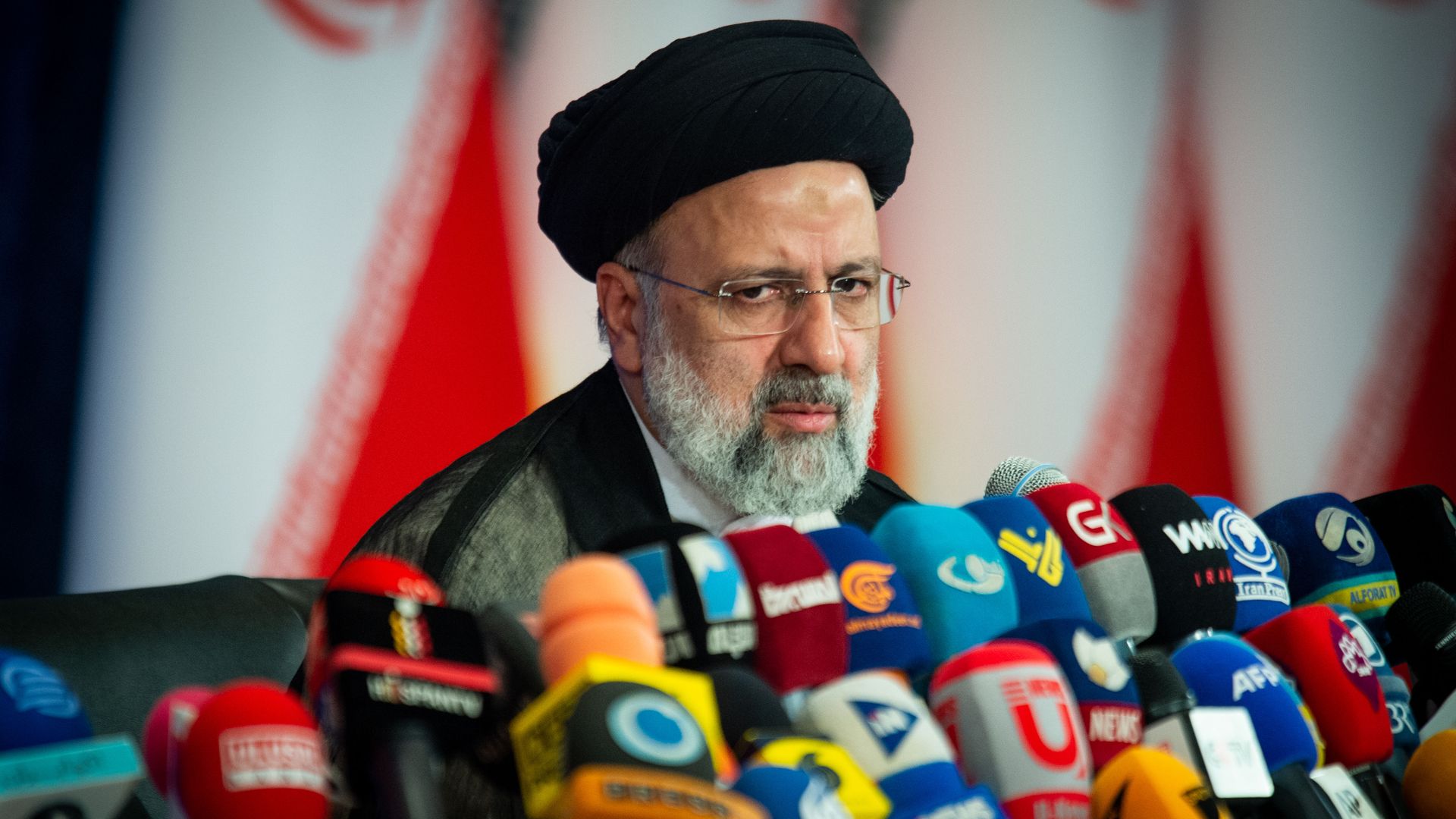 |
|
| Raisi displays his impressive microphone collection today in Tehran. Photo: Ali Mohammadi/Bloomberg via Getty |
| |
| The election of conservative cleric Ebrahim Raisi as Iran's next president injects new urgency into the efforts to revive the 2015 nuclear deal, but could preclude the possibility of a "longer and stronger" agreement. Why it matters: President Biden hopes to put Iran's nuclear program "back in a box" by salvaging the previous deal and then negotiate a follow-on accord to extend the deal's timelines and cover Iran's missile program and other issues. Driving the news: In his first press conference today, Raisi ruled out negotiating over missiles or meeting with Biden. - Raisi is a loyal protégé of Supreme Leader Ali Khamenei and seems to share his hostility toward the West — a significant shift from outgoing President Hassan Rouhani.
- The Biden administration hoped the prospect of deeper economic engagement could keep Iran at the table beyond the restoration of the 2015 deal, but that's unlikely to be a priority for Raisi, notes Henry Rome of Eurasia Group.
Yes, but: Raisi did underscore today the necessity of the sanctions relief Iran would receive if the U.S. returns to the 2015 deal, which Donald Trump abandoned in 2018. - A U.S. official told me on Friday the administration wants to finalize an agreement for both sides to return to compliance with the deal — which Iran has violated by accelerating its nuclear program — before Raisi takes power six weeks from now.
- "If we don't have a deal before a new government is formed, I think that would raise serious questions about how achievable it's going to be," the official said.
The latest: A sixth round of talks ended yesterday without a deal, though before departing Vienna some of the negotiators expressed optimism that one could be reached in the next few weeks. - The head of the UN's nuclear watchdog group said last week that it was clear a deal would have to wait for the new government, but the U.S. official insisted the talks could break down if they drag into August without a breakthrough.
- Between the lines: Analysts and some diplomats involved in the negotiations have long said it would be easier to reach an agreement with the outgoing administration than with a newly inaugurated government, particularly one led by Raisi.
Raisi's election victory was stage-managed, with Iran's Guardian Council preventing all other well-known candidates from running — an unusual level of political control even for Iran. - Record-low turnout spoke to the disillusionment of voters not only with the options on the ballot, but with a system that has seemed unable to cope with Iran's economic and COVID-19 crises.
- Rouhani and the moderate camp have absorbed much of the blame, but that buffer will be gone once Raisi assumes office and hard-liners control every branch of the government.
- And while Raisi is seen as the leading contender to succeed Supreme Leader Ali Khamenei, 82, recent Iranian presidents have tended to leave office diminished rather than strengthened, notes Azadeh Zamirirad of the German Institute for International and Security Affairs.
What to watch: Whether or not Raisi is to become supreme leader, there is another transition looming in Iran. Khamenei will have a loyalist in the presidency to help him ensure the revolution endures. |
    |
| |
| |
| 2. Ethiopia holds a vital, flawed election |
 |
|
| Waiting to vote in Addis Ababa. Photo: Marco Longari/AFP via Getty |
| |
| Ethiopians went to the polls today in long-delayed elections. Well, some did. Millions were prevented from voting due to security or logistical concerns, and others boycotted the vote, citing the repression of opposition parties. Why it matters: Prime Minister Abiy Ahmed has won a Nobel Peace Prize and launched a war that has devolved into ethnic cleansing — all without having been elected. This election had been seen as a chance for him to gain democratic legitimacy and Ethiopia to hold its first free and fair election. - But there will be no votes cast in Tigray, where a war is raging on after seven months, and voting was postponed in two other regions.
- In Ethiopia's largest region, Oromia, the leading opposition parties are boycotting the vote.
- Abiy's Prosperity Party is almost certain to win.
The big picture: Abiy took power in 2018 promising new political freedoms and espousing a vision of an Ethiopia defined by national rather than ethnic or regional identity. - But with that period of liberalization came intense unrest, and Abiy has clamped back down. He once symbolized the end of authoritarian rule, but some fear he's now reestablishing it.
Go deeper: EU envoy: Ethiopia's leaders said they'd "wipe out" Tigrayans |
    |
| |
| |
| 3. State of the outbreak: China's billion doses |
 Data: Our World in Data; Chart: Danielle Alberti/Axios China has now administered 1 billion doses of coronavirus vaccines — 500 million of them in just the past month. That's half of the global total during that period. The big picture: China's vaccine rollout started slowly, due in part to a low sense of urgency and also to the fact that the government was focusing on exporting doses. - Demand for vaccines grew after the Delta variant, first discovered in India, began spreading in Guangzhou. Authorities have also been offering food or other inducements to encourage vaccination, per the NYT.
- The Chinese-made vaccines being distributed appear to be less effective than the alternatives offered in the U.S. and EU, but still provide protection against severe disease.
China's current pace of 20 million vaccinations per day is far higher than the peak of around 3 million per day in the U.S., even adjusted for population. - The government aims to have 40% of the population fully vaccinated by the end of the month.
In other news... - The Biden administration on Monday announced a list of countries that will receive the remaining 55 million doses it pledged to allocate by the end of this month.
- The number of cases being recorded in Africa nearly doubled over the past week, with Botswana and other southern African countries hit particularly hard.
- Tanzania has reversed course after the death of the COVID-denying President John Magufuli, acknowledging that there are cases in the country and seeking vaccines.
- Brazil surpassed 500,000 deaths over the weekend as demonstrators around the country protested President Jair Bolsonaro's handling of the pandemic and the vaccine rollout. Daily cases remain as high as at any other point in the pandemic.
|
    |
| |
| |
| A message from The U.S. Global Leadership Coalition |
| Foreign aid: what's it worth? |
| |
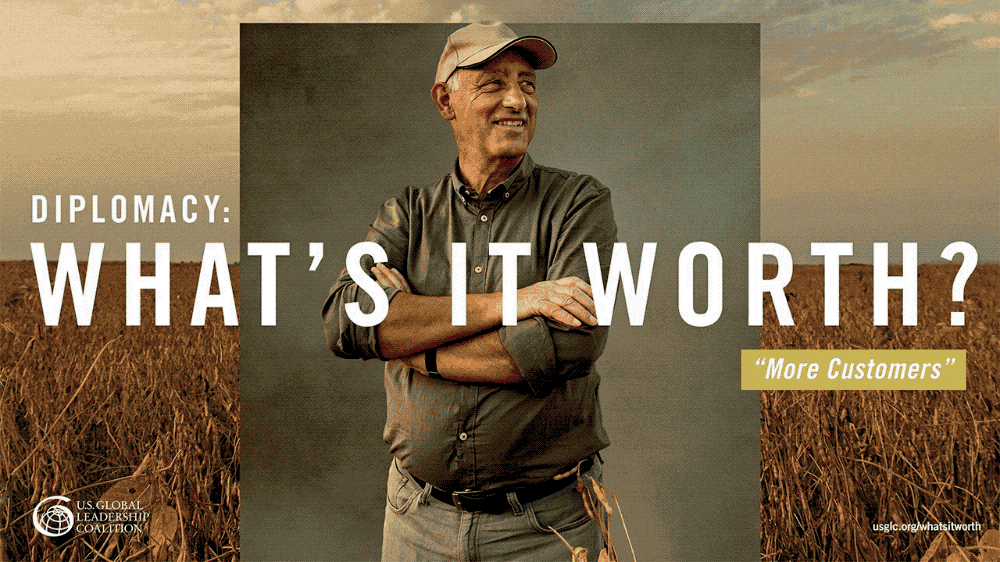 |
| |
| The global COVID-19 pandemic made it painfully clear what happens abroad matters at home. Engaging around the world protects the interests of Americans. Here's how: Diplomacy, development and global health investments help make America safer, healthier and more prosperous. Learn more. |
| |
| |
| Bonus: Where in the World? |
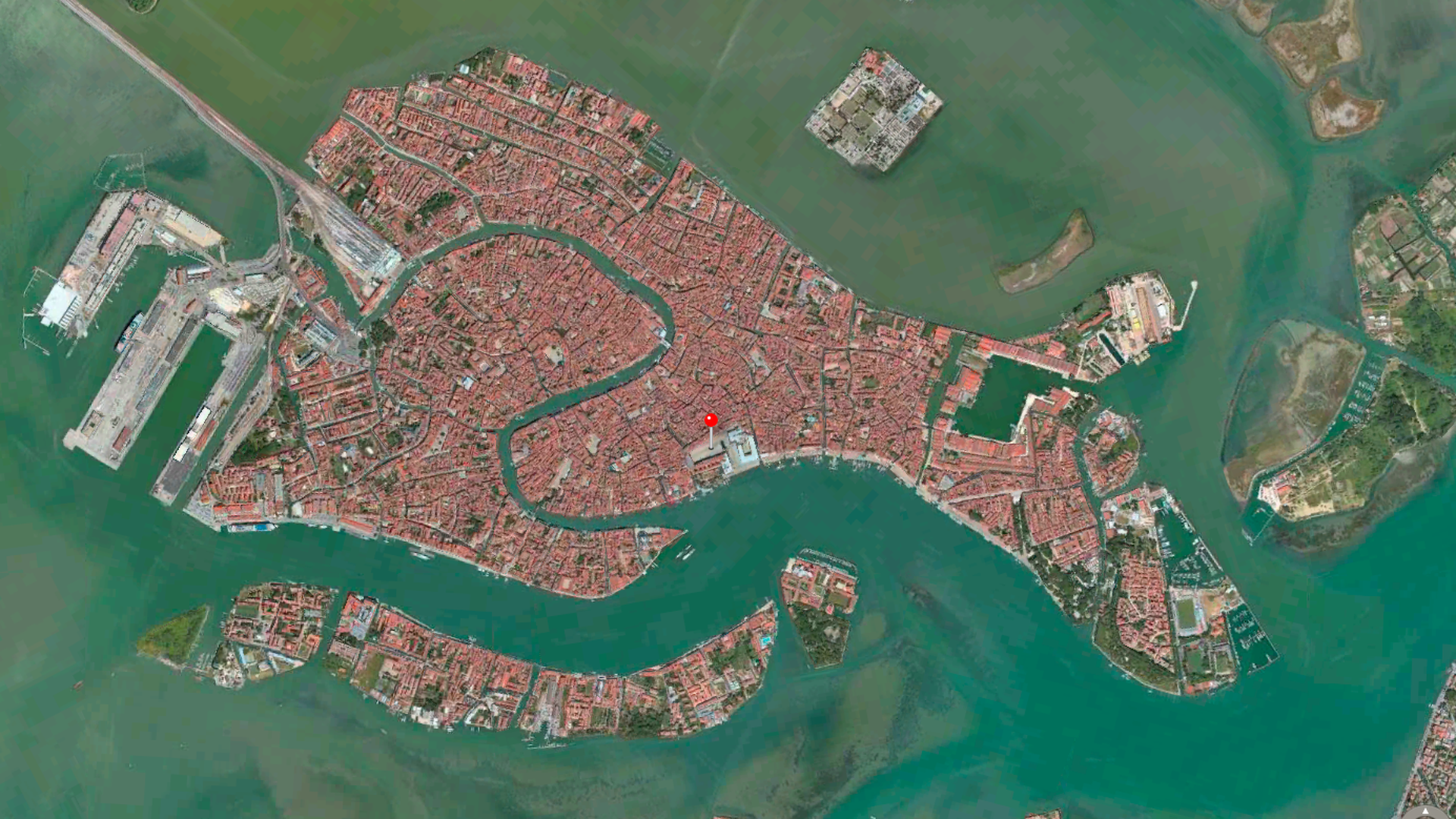 |
|
| Screengrab via Apple Maps. |
| |
| I'm visiting the main square of a city that is beautiful from every angle, including from the sky. Where am I? Scroll to the bottom for the answer. |
    |
| |
| |
| 4. Global news roundup |
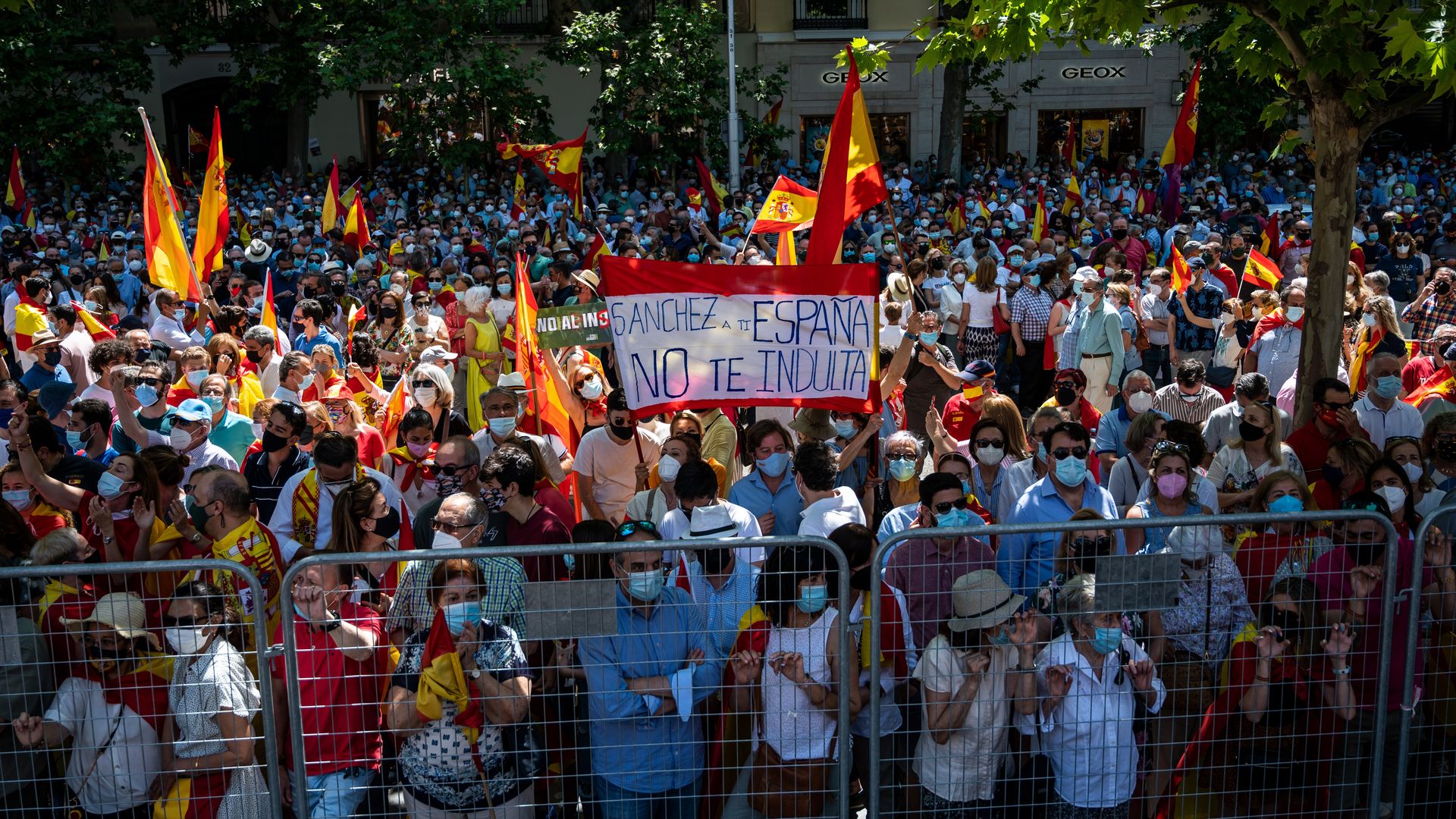 |
|
| Protesting the pardons of Catalan leaders, in Madrid. Photo: Marcos del Mazo/LightRocket via Getty |
| |
| 1. Spanish Prime Minister Pedro Sánchez today confirmed plans to pardon 12 separatist Catalan leaders who organized an unsanctioned referendum in 2017, citing the need for "forgiveness" and reconciliation. - Why it matters: There is perhaps no more contentious issue in Spanish politics today than Catalan independence. Most Spaniards oppose the pardons.
- Between the lines: Sánchez's government relies on a Catalan party that supports the pardons and advocates a more pragmatic approach to the independence issue.
2. Swedish Prime Minister Stefan Löfven lost a no-confidence vote on Monday, giving him a week to call a snap election or try to form a new coalition. - Why it matters: He was the first Swedish prime minister to lose a confidence vote. The dispute was over a plan to weaken rent controls to encourage the construction of more homes.
3. Armenian Prime Minister Nikol Pashinyan's party easily won a snap election on Sunday, a surprise result that comes seven months after he signed a cease-fire deal with Azerbaijan that was seen by many Armenians as a betrayal. - The big picture: "This is much less an endorsement of Pashinyan, but much more a refusal of Armenians to go back to the former authoritarian regime of the past," Richard Giragosian, director of the Yerevan-based Regional Studies Center, told the AP.
4. Regional elections in France on Sunday provided a series of embarrassing defeats for both President Emmanuel Macron and his far-right rival Marine Le Pen. - Why it matters: Macron and Le Pen are expected to face off in a presidential election next year, but both are quite unpopular. Turnout was historically low, reflecting widespread voter disillusionment.
5. Armin Laschet, the front-runner to succeed Angela Merkel as German chancellor, backed a "cautious" approach to China in an interview with the FT, saying Beijing was as much partner as competitor. |
    |
| |
| |
| 5. Why Imran Khan won't challenge China |
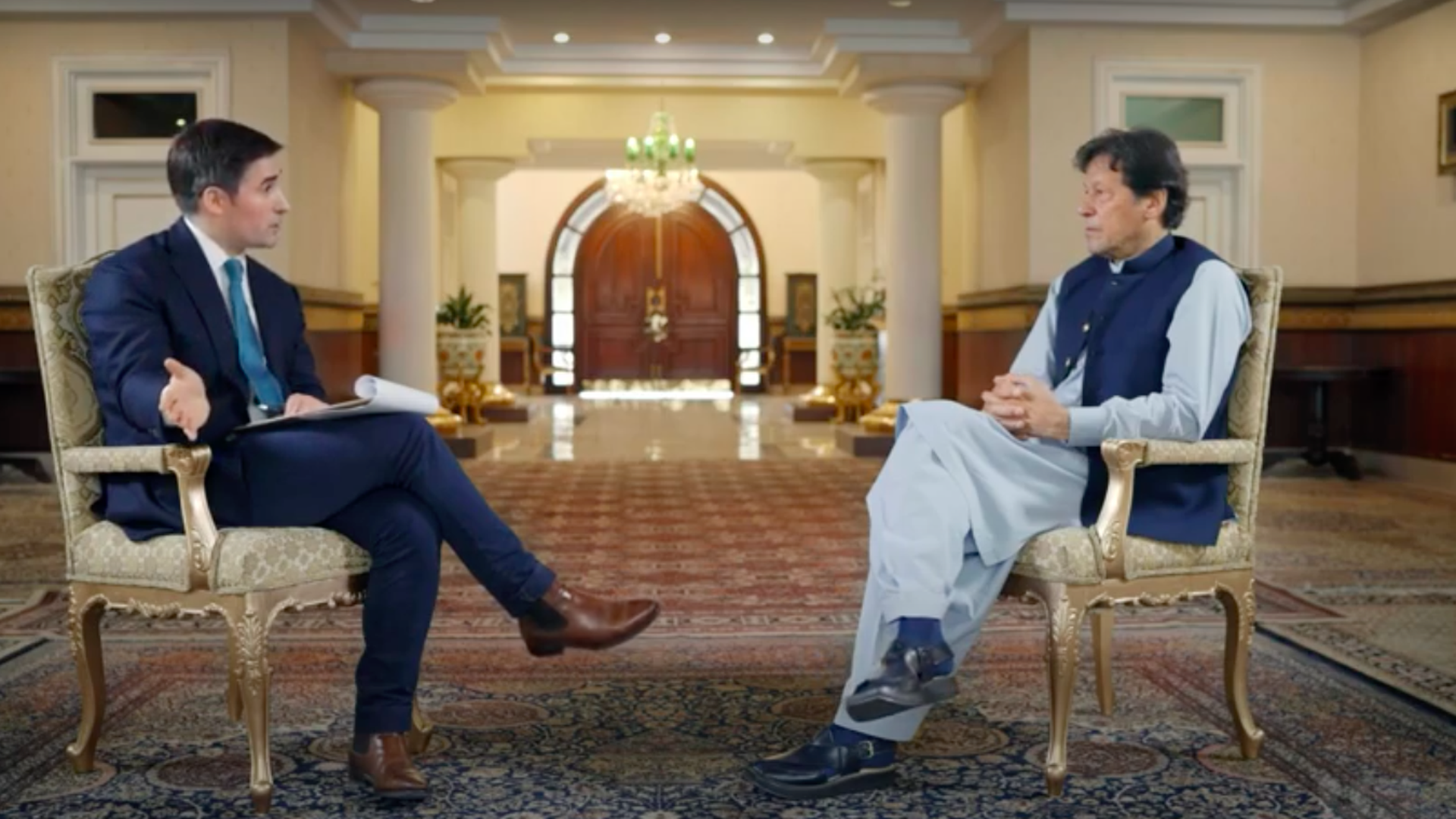 |
|
| Swan (L) with Khan. Screengrab via "Axios on HBO." |
| |
| Why does Pakistani Prime Minister Imran Khan condemn Islamophobia in Europe and around the world but remain silent about the genocide against Uyghur Muslims in nearby Xinjiang, China? - Asked by Jonathan Swan on "Axios on HBO," Khan tried a few explanations — China denies that it's taking place, Kashmir is a higher priority — but he ultimately acknowledged that due to the importance of the economic relationship with China, "whatever issues we have, we speak behind closed doors."
- Why it matters: It's not just Pakistan. As countries around the world grow increasingly economically dependent on China, they're less willing to stand up to Beijing on human rights and other issues.
- Watch the clip.
More from the interview: - Khan said he would "absolutely not" allow the CIA to conduct cross-border operations from Pakistan into Afghanistan after the U.S. withdrawal, but did not say whether the U.S. could use Pakistani air space to conduct air strikes, saying the U.S. hadn't raised the issue.
- Asked about accusations that he had effectively blamed the victims of sexual assault by citing the importance of more modest clothing, Khan said: "If a woman is wearing very few clothes, it will have an impact on the men unless they are robots."
- Khan said he hadn't spoken with President Biden yet but would be happy to once Biden finds the time.
Go deeper: Afghan president coming to Washington on Friday |
    |
| |
| |
| 6. What I'm reading: Lunch with "the founding father of Putinism" |
 |
|
| Surkov (L) with Putin in 2012. Photo: Alexei Nikolsky/AFP via Getty |
| |
| Henry Foy conducted a delightful and disturbing interview with Vladislav Surkov in this weekend's "Lunch with the FT." Why it matters: "Never elected, he was Putin's chief ideologist and by most accounts his closest political confidant for more than a dozen years, who went on to stage-manage the 2014 annexation of Crimea and Russia's involvement in the ongoing war in eastern Ukraine," Foy writes. Now out of the Kremlin, Surkov offered a tantalizingly candid account of how Putin's Russia actually functions. - "An overdose of freedom is lethal to a state. Anything that is medicine can be poison. It is all about the dosage," he said.
- The dosage Surkov prescribed was a "systemic opposition" that can run against Putin's United Russia but never threaten its hold on power.
He also defended the steady diet of propaganda he helped prepare over the years. - "Most people need their heads to be filled with thoughts," he said, saying simple messages were most effective. "Everyone takes advantage of such people all over the world," he said with a laugh.
Surkov even defended his own ouster in 2020, saying that people who grow too powerful behind the scenes must be replaced every once in a while. - But he may not be finished yet. Asked about the post-Putin transition, Surkov said, "If I live long enough, when it happens, then I will have a job."
Dive in |
    |
| |
| |
| 7. Stories we're watching |
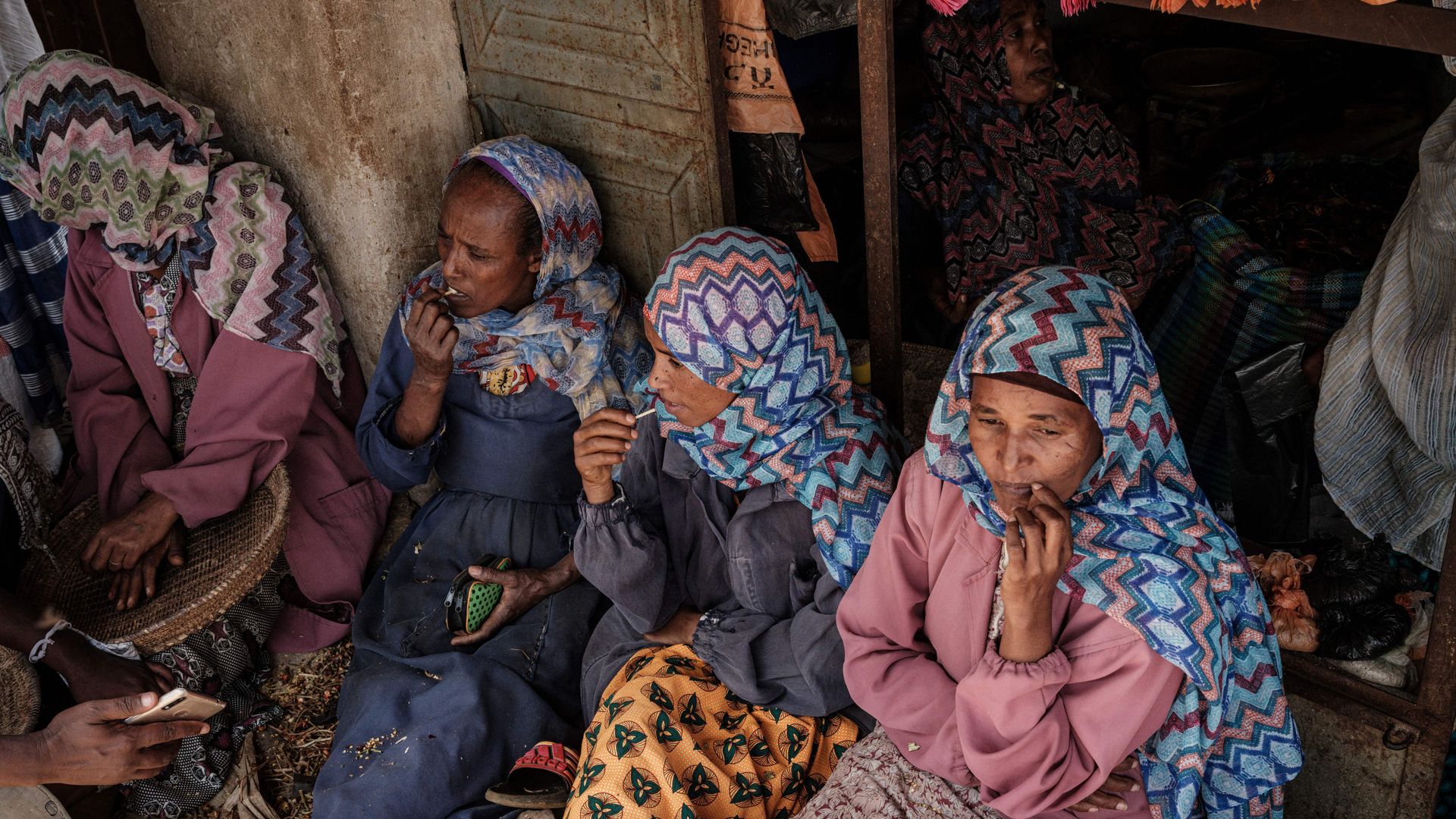 |
|
| Women brush their teeth with eucalyptus branches at the Monday Market in Mekele, capital of Ethiopia's war-torn Tigray region. Photo: Yasuyoshi Chiba/AFP via Getty |
| |
- Vaccine news: Palestinian Authority cancels deal with Israel; U.S. sends 2.5 million doses to Taiwan
- Sports + Covid: Olympics to allow spectators; World Cup to require vaccination
- West African bloc plans to launch single currency in 2027
- UN chief Guterres re-elected through 2027
- UN calls for Myanmar arms embargo
- New Belarus sanctions; more Russia sanctions coming
- After Putin summit, Biden considers meeting Xi Jinping
Quoted: "We thought we'd be able to make it to the end of the month. It's just getting harder and harder. It's essentially a matter of days." — An adviser to Jimmy Lai, the jailed owner of Apple Daily, on how long the Hong Kong pro-democracy newspaper can survive after Chinese authorities froze its bank accounts and jailed top executives. |
    |
| |
| |
| A message from The U.S. Global Leadership Coalition |
| The world has changed |
| |
 |
| |
| America can't ignore what happens outside our borders. Investments in diplomacy, development and global health help the U.S. stand with our allies, open new export markets, get more Americans back to work and prevent the next pandemic from reaching our shores. What's it worth? Everything. |
| |
| We're visiting Piazza San Marco in beautiful Venice, Italy. |
 | | The tool and templates you need for more engaging team updates. | | |












No comments:
Post a Comment